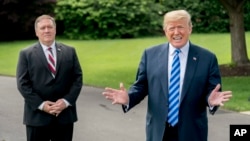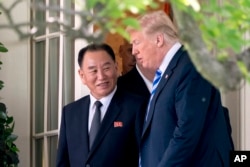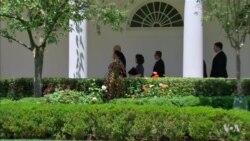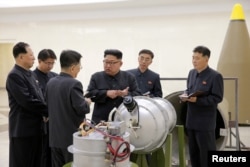U.S. President Donald Trump on Friday met for 80 minutes in the Oval Office with a general he described as the second most powerful man in North Korea.
Afterward, Trump told reporters on the White House South Lawn that the June 12 summit in Singapore between him and North Korea's leader, Kim Jong Un, was back on.
Trump, however, sought to quell some of the high expectations, saying the summit would "be a beginning" and subsequent discussions were likely to be needed to get Pyongyang to agree to denuclearization.
"We're not going to go in and sign something on June 12th, and we never were," he said. "We're going to start a process."
Trump declared he "never said it happens in one meeting," but that it "will ultimately be a successful process."
Asked by VOA News whether the North Koreans had committed to complete, verifiable and irreversible denuclearization, Trump replied only that "we talked about a lot of things."
WATCH: It's Back On: Trump to Meet Kim in Singapore on June 12
'Take your time'
The president said he told Kim Yong Chol, the former head of North Korean military intelligence, "Take your time. We can go fast. We can go slowly."
The president made clear that sanctions on North Korea would not be lifted, however, until the country agreed to give up its nuclear arsenal.
As the negotiations over the Singapore summit play out in public, there is a sense among some observers that Trump and Kim Jong Un each have a clear sense of the deal they ultimately want to strike.
Less clear is whether the U.S. and North Korean visions can match up in any meaningful way.
WATCH: Trump Discusses Meeting With North Korea's Kim Yong Chol
"Singapore might be the first time people will have to put their cards on the table," a U.S. official said on the condition of anonymity.
Upon his arrival Friday at the White House, Kim Yong Chol, who is under U.S. sanctions for links to cyberattacks against American companies, delivered a letter from Kim Jong Un.
While Trump did not reveal the contents, he described the gesture as "very nice."
Kim Yong Chol was then escorted to the Oval Office by White House Chief of Staff John Kelly.
Trump, with Secretary of State Mike Pompeo standing alongside, answered questions from a pool of reporters, including VOA, for about 15 minutes after he saw off the North Korean general.
Human rights discussion
Trump was also asked if human rights was discussed on Friday.
"We did not talk about human rights," Trump replied, but added that on June 12, "I think we probably will."
North Korea's human rights record is considered among the worst in the world.
Trump marveled at the apparent progress he has made with the Asian nation, considered by the U.S. military to be the biggest immediate security threat to the United States.
North Korea is estimated to have more than a dozen nuclear weapons and has been quickly advancing its development of intercontinental ballistic missiles.
"I don't even want to use the term 'maximum pressure' anymore," Trump told reporters, referring to his administrations sanctions campaign against North Korea.
"Can you believe we're talking about ending the Korean War?" Trump asked reporters, adding that a peace treaty is "something that could come out of the meeting."
The two Koreas,with China siding with the North and the United States allied with the South,have technically remained at war since 1950 despite a 1953 armistice.
But the U.S. intelligence community has been more cautious all along. In its most recent Worldwide Threat Assessment issued in February, it said it doubted North Korea was willing to give up its fledgling nuclear arsenal.
"Pyongyang's commitment to possessing nuclear weapons and fielding capable long-range missiles, all while repeatedly stating that nuclear weapons are the basis for its survival, suggests that the regime does not intend to negotiate them away," the report said.
The U.S. president said that after relations were normalized with Pyongyang, China, South Korea and Japan were "going to help a lot" in building the economy of North Korea, which is ranked as the poorest country in Asia.
Only one other senior North Korean official is known to have visited the White House. That was Vice Marshal Jo Myong Rok, who delivered a letter from then-leader Kim Jong Il to President Bill Clinton in late 2000. But that peace effort collapsed soon afterward with the election of George W. Bush, who as president cut off contacts with the North Koreans.
VOA's Jeff Seldin contributed to this report.









